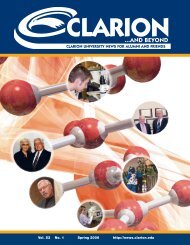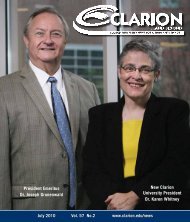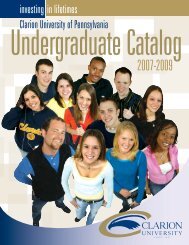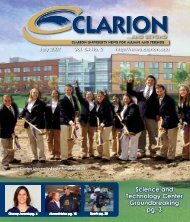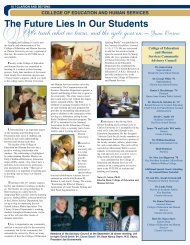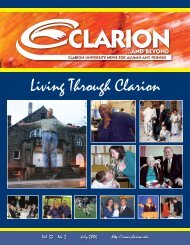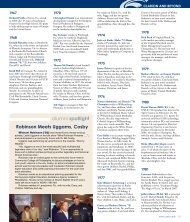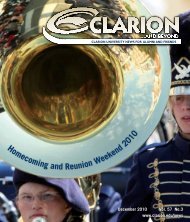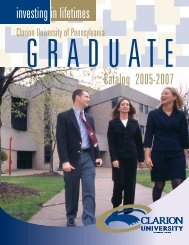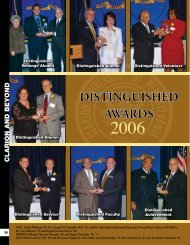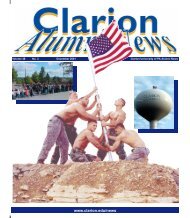Graduate - Clarion University
Graduate - Clarion University
Graduate - Clarion University
- No tags were found...
You also want an ePaper? Increase the reach of your titles
YUMPU automatically turns print PDFs into web optimized ePapers that Google loves.
<strong>Clarion</strong> <strong>University</strong> of Pennsylvania 51SCED 575: Career Orientation in Science and Technology (COST) 3 s.h.COST involves middle/junior high teachers in utilizing the skills of community resource people to demonstrate the needfor science in many careers-including those not traditionally associated with science. The format of the course follows theCOMETS (Career Orientated Modules to Explore Topics in Science) model. Teachers learn where to find science-resourcepeople and how to work with the resource person to present lessons in the classroom. Teachers implement lessons with aresource person during the course. On demand. Permission of instructor required.SCED 576: Science, Technology, and Society: Topics for Teachers 3 s.h.Interdisciplinary course covering topics in biology, earth science, chemistry, and physics designed to acquaint studentswith information, curricula, and teaching methodologies appropriate for teaching STS topics in traditional science courses.Students will be involved in studies and hands-on activities concerning science computer software, testing water for chemicaland biological agents, and remote sensing techniques in geology, geography, physics, and medicine. Investigates and discussesethical issues and scientific principles concerning computers, energy, nuclear waste, biotechnology, and others, will beinvestigated and discussed. Participants develop curriculum activities for implementation in their science discipline. Requiredfor environmental biology, general science, and earth science certification.SCED 577: Microcomputers Science Laboratory Interface 1 s.h.This course is designed to instruct elementary and/or secondary science teachers in basic interfacing and interfacingapplications for their own classrooms. Course participants construct interfacing materials, set up related science investigations,and analyze data collected from the constructed probes. Course participants also explore possible uses for interfacing equipmentin the science curriculum. On demand. Permission of instructor required.SCED 578: Information Technology Education for the Commonwealth (ITEC I) 3 s.h.ITEC I is designed to provide teachers with computer literacy, programming skills, and experiences with exemplarycourseware and software. The course is designed specifically for computer novices. Teachers will learn to operate and programmicrocomputers while developing skills needed for teaching their students to use microcomputers for classroom applications.The course also prepares teachers to evaluate courseware and software appropriate for use in their school curriculum. Ondemand. Permission of instructor required.SCED 579: Information Technology Education for the Commonwealth (ITEC II) 3 s.h.Provides K-12 educators with intermediate-level competencies to effectively integrate microcomputer courseware,hardware, and related microprocessor technology into the teaching and learning process. Instructional theory for the designand evaluation of solutions to problems of learning, and using computer technology as a tool, will also be emphasized inthe course. Students will complete a computer-generated portfolio of related lesson plans, handouts, transparencies, etc. Ondemand. Permission of instructor required.SCED 585: Planetarium Operation and Management 3 s.h.An introduction to the techniques of operation and maintenance of planetarium projectors. Opportunities are provided forwriting and presenting programs at various levels of instruction. The use of auxiliary projectors, the production of audiovisualmaterials, multimedia displays and live versus programmed presentations are emphasized. Prerequisite: ES 200 and 201 orconsent of instructor. On demand.SCED 600: Research Project in Science Education 1-3 s.h.With the approval of his or her advisor a student may research a selected topics related to the teaching of elementary and/orsecondary science. Permission of instructor. Each semester. Maximum credits allowable toward graduation: 9 credits.Education/Reading/Science EducationWorld Languages CoursesED 539: Second Language Acquisition and Methods of Teachingand Evaluating World Languages3 s.h.Examination of the psychological and linguistic foundations of modern language acquisition. Techniques of teaching andevaluating modern languages and cultures. Analysis of recent research in the area of second language acquisition with a focuson the integration of the National Standards for Foreign Language Education.FR 417: French Literature and Culture in an Immersion Setting 3 s.h.This course, taught in France, includes three core components: 1. Contemporary French culture, 2. French literature (withfocus on a specific topic or author), and 3. French art history, as well as mandatory field trips and informal cultural experiences.<strong>Graduate</strong>-level course primarily offered for K-12 teachers of French.SPAN 417: Spanish Language and Cultural Immersion 3 s.h.Consists of a trip to a Spanish-speaking country for two to five weeks depending on the itinerary planned by the instructorprior to departure (no matter what the length, however, it will consist of the usual number of semester hours). During thisperiod, students will visit places of historical and cultural interest in the country, receive lectures on the historical, cultural,artistic, or literary importance of the sites visited, conduct as much of their daily routines in Spanish as possible. Courseoffered to graduate students and undergraduates.SPAN 501: Special Topics in Hispanic Language and Culture 3 s.h.In-depth examination of contemporary Hispanic literature and cultural issues including but not limited to such topics asHispanic women writers, Latino cultures in the United States, and relationships between Hispanic nations and the UnitedStates. Course is taught in Spanish. Student may enroll up to three times for a maximum of nine credits.



